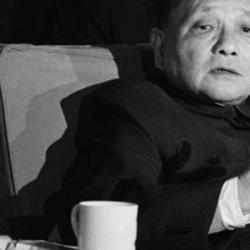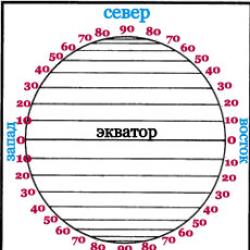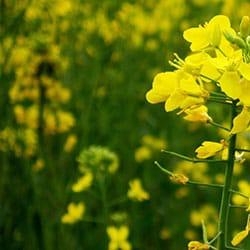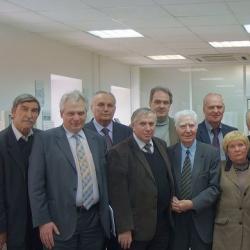Life and work of Fet. Interesting facts from Fet's life. Afanasy Afanasyevich fet biography In what year did fet die
Born into the family of landowner Afanasy Neofitovich Shenshin and his mother, who left her husband Johann-Peter Fet for him. After fourteen years, the Oryol spiritual consistory returned the surname of his mother’s previous husband to Afanasy, which caused him to lose all the privileges of the nobility. Fet studied at first at home, then was sent to a German boarding school in Verro and graduated brilliantly in 1837.
In 1837 Afanasy Fet came to Moscow and studied at the boarding school of Professor M.P. Pogodin and in 1838 he entered first the Faculty of Law, then the Historical and Philological Department of the Faculty of Philosophy of Moscow University.
In 1840, he published at his own expense a collection of poems, “A.F.’s Lyrical Pantheon,” which was praised in “Notes of the Fatherland” and scolded in “Library for Reading.”
In 1842 - 1843, his eighty-five poems were published in Otechestvennye zapiski.
In 1845, Afanasy Fet entered the cuirassier regiment stationed in the Kherson province as a non-commissioned officer, wishing to acquire hereditary Russian nobility. In 1846 he was awarded his first officer rank.
In 1847, censorship permission to publish the book was obtained and a book of poems was published in 1850. The poems received positive reviews in the magazines Sovremennik, Moskvityanin, and Otechestvennye zapiski.
In 1853, Afanasy Fet joined the Uhlan Guards regiment, stationed near Volkhov, and began to visit St. Petersburg more often. Here he began to communicate with the new editors of Sovremennik N. Nekrasov, I. Turgenev, V. Botkin, A. Druzhinin.
In 1854, his poems began to be published in Sovremennik.
In 1856, Afanasy Fet left military service with the rank of guards headquarters captain, having not achieved the nobility, and settled in Moscow. In 1857 he married M.P. Botkina.
In 1860, he bought an estate in Mtsensk district and, in the words of I. Turgenev, “became an agronomist-owner to the point of despair.”
From 1862, he began to regularly publish essays in the editorial “Russian Bulletin” that exposed the conditions in the countryside.
In 1867 - 1877 Afanasy Fet was elected justice of the peace.
In 1873, the surname Shenshin was recognized as his surname and hereditary nobility was granted. During this period, he was little involved in literary activities.
In 1881, Afanasy Fet bought a mansion in Moscow and in the same year his translation of “The World as Will and Representation” by A. Schopenhauer was published.
In 1882, he published his translation of the first part of “Faust” by I.V. Goethe.
In 1883, Afanasy Fet began publishing his poems again in the form of collections “Evening Lights”.
In 1888, the second part of “Faust” by I.V. was published. Goethe translated by Afanasy Fet and the third collection of poems “Evening Lights”.
Afanasy Fet died of a suspected heart attack on November 21 (December 3), 1892 in Moscow. He was buried in the village of Kleymenovo, the family estate of the Shenshins.
“Death” Afanasy Fet
I have died in my life and I know this feeling,
Where all torment ends and languid hops are sweet;
That's why I wait for you without fear,
Night without dawn and eternal bed!Let your hand touch my head
And you will erase me from the list of existence,
But before my judgment, while the heart beats,
We are equal forces, and I triumph.You are still submissive to my will every moment,
You are a shadow at my feet, you are an impersonal ghost;
As long as I breathe, you are my thought, no more,
The shaky toy of a yearning dream.
Analysis of Fet's poem "Death"
Researchers of Fet's work often call his lyrics life-affirming. In one form or another, this idea is found in the statements of Balmont, Blagoy, and Bryusov. A close friend of the poet Strakhov believed that reading his poems “strengthens and refreshes the soul.” At the same time, many literary scholars emphasize the contradictory nature of Afanasy Afanasievich. In their opinion, through poetry he managed to overcome the tragedy of life. He considered the physical world meaningless, boring and base. He described his stay there as sad. In Fet's lyrics, the theme of life and death is viewed through the prism of Christian, Platonic, and Schopenhauerian ideas. It is worth noting that the philosophy of pessimism of the great German thinker had a strong influence on Afanasy Afanasievich. At one time he was even involved in translating Schopenhauer’s works into Russian.
The poem “Death” was created in 1884. It is included in the second issue of the collection “Evening Lights” (1885). The title shows that Fet directly addresses the old woman with a scythe and writes a dedication to her. The lyrical hero faces his inevitable end fearlessly. He knows firsthand the feeling of approaching death. He considers it the end of all life's torments. In the first stanza, leaving for another world is compared to “eternal bed” and “dawnless night.” Next, readers are presented with a kind of duel. It seems that death is ready to touch the head of the lyrical hero, forever erasing him from the list of existence. But he is not going to surrender so easily to the mercy of the ruthless winner. Moreover, the battle ends with the triumph of man. In the third stanza, the hero calls death an impersonal ghost, a shadow at his feet, “the toy of a shaky, yearning dream.”
In the second issue of the book “Evening Lights”, number twenty, there is a poem “The sun is setting, and the flying wind has died down...” (1883). It is directly related to the text we are considering. Death is accepted in him as something inevitable, invincible:
...Oh, if only heaven would judge without heavy languor
The lyrical hero dreams of a peaceful death, which he correlates with sunset:
Only the sunset will burn slightly visibly for a long time;
Oh, if only the sky promised without heavy languor
It’s the same for me, looking back at life, to die!
In "Death" readers are offered a completely different picture. The lyrical hero rejects death, considering it an insignificant phenomenon compared to the thinking “I” of a person. Such an obvious discrepancy is not accidental. In “Evening Lights,” Fet groups poems in such a way as to show readers the same things from different sides, to demonstrate sometimes radically opposing points of view. According to the poet, the versatility of existence could be conveyed exclusively through contradictions. You should also pay attention to the poem “Death” (1878), included in the section “Elegies and Thoughts” of the first issue of “Evening Lights”. The attitude towards the old woman with the scythe is changing again. Afanasy Afanasievich presents the inevitable end of the earthly human path as a value:
...But if life is God’s noisy bazaar,
Only death is his immortal temple.
I dare to suggest that Fet’s perception of death is closely connected with the main tragedy of his life - the death of Maria Lazic, his only beloved. The girl died in 1850 from severe burns received in a fire. At the same time, the history of the poet’s relationship with Lazic cannot be called happy. They could not get married because of Afanasy Afanasievich’s poverty at that time, but they did not have the strength to part forever. The death of Maria Kozminichna turned out to be both a huge misfortune and the resolution of a difficult situation.
Afanasy Afanasyevich Fet (11/23/1820-11/21/1892), Russian poet. His father was the German Johann-Peter-Karl-Wilhelm Föth, assessor of the Darmstadt city court. Mother Charlotte-Elizabeth Becker was married to her husband for only about a year. She, being pregnant by him (this is confirmed by her letters to her first husband and relatives), became interested in a 45-year-old Russian nobleman, captain Afanasy Shenshin, who was in Germany undergoing treatment, and in September 1820 she left with him for Russia.
Her son was born in the village. Novoselki, Oryol province, was baptized according to the Orthodox rite, named Afanasy, and was recorded in the registry register as the son of the landowner Afanasy Neofitovich Shenshin. In September 1822, Shenshin married Charlotte Becker, who converted to Orthodoxy before the wedding and began to be called Elizaveta Petrovna Fet.
In 1834, when Afanasy Shenshin was 14 years old, a certain “error” was discovered in the documents (lack of official adoption), the boy was deprived of his surname, nobility and Russian citizenship and became “Hessendarmstadt subject Afanasy Fet.” This became a mental trauma for him, since he considered himself the son of Shenshin, and not Fet. Only in 1873 did he manage to officially take the surname Shenshin, but he continued to sign his literary works with the surname Fet, since he had already gained fame with this name.
In 1834–1837 Fet studied at a German boarding school in Verro (now Võru, Estonia), then at the verbal department of the Faculty of Philosophy (graduated in 1844), where he became close to the writers A.A. Grigoriev, Ya.P. Polonsky. During the same period, he began to write and publish his poems.
Fet's first collection of poetry, "Lyrical Pantheon", was published in 1840 with the participation of Grigoriev. In 1842, publications followed in the magazines “Moskvityanin” and “Otechestvennye zapiski”. In 1845, wanting to serve the nobility, Fet entered military service in a cuirassier regiment and a year later received his first officer rank.
In 1850, a second collection of poems was published, which met with positive reviews from critics. 1853 Fet is transferred to a guards regiment stationed near St. Petersburg. The poet often visits the capital and gets acquainted with, etc. He becomes close to the editors of the Sovremennik magazine. With their assistance, Fet's third collection appeared in 1856 (edited by Turgenev).
Having married M.P. in 1857. Botkina, the poet resigns with the rank of guards captain and becomes a successful landowner. He stopped publishing, and in 1859 he ended his relationship with the Sovremennik magazine. Even the publication of a two-volume collection of Fet’s poems in 1863 does not change this. In 1867, Fet was elected justice of the peace for 11 years. In 1873, the nobility and the surname Shenshin were returned to him.
During the years of Fet's poetic silence, his interests are evidenced by the works of Horace, Ovid, Goethe ("Faust"), and the philosophical treatises of Schopenhauer translated into Russian. Only in his later years did Fet return to poetic creativity, releasing 4 collections of poems under the general title “Evening Lights” (1883, 1885, 1888, 1891). He also wrote memoirs “My Memories” and “The Early Years of My Life.”
Fet's romantic poetry is apolitical and alien to the interests of public life of that time (he constantly argued with Nekrasov about this). Fet keenly feels and unusually “musically” reflects in his poems the currents of existence in Russian nature, which also reflect the “landscape” of the multifaceted Russian soul. This is the main strength of the harmonious poetry of a native German by blood, who became an outstanding Russian poet.
Fet died in Moscow of a heart attack on November 21, 1892. He was buried in the village of Kleymenovo, the Shenshin family estate.
FROM THE POEMS OF A.A. FETA
Wonderful picture
How dear you are to me:
White plain,
Full moon,The light of the high heavens,
And shining snow
And distant sleighs
Lonely running.What a night! Everything is so blissful!
Thank you, dear midnight land!
From the kingdom of ice, from the kingdom of blizzards and snow
How fresh and clean your May leaves!What a night! Every single star
Warmly and meekly they look into the soul again,
And in the air behind the nightingale's song
Anxiety and love spread.The birches are waiting. Their leaves are translucent
Shyly beckons and pleases the eye.
They are shaking. So to the newlywed virgin
Her attire is both joyful and alien.No, never more tender and incorporeal
Your face, O night, could not torment me!
Again I come to you with an involuntary song,
Involuntary - and the last, perhaps.Not so, Lord, mighty, incomprehensible
You are before my restless consciousness,
That on a starry day your bright Seraphim
A huge ball lit up the universe.
And a dead man with a flaming face
He commanded that Your laws be observed,
Awaken everything with a life-giving ray,
Preserving your ardor for centuries, millions;
No, You are powerful and incomprehensible to me
Because I myself, powerless and instantaneous,
I carry it in my chest like the Seraphim,
Fire is stronger and brighter than the entire universe,
Meanwhile, like me, the prey of vanity,
The playground of her inconstancy,
In me he is eternal, omnipresent, like You,
Knows neither time nor space.The longer I live, the more I experience,
The more commandingly I constrain the hearts of ardor,
It’s all the more clear to me that it hasn’t happened since ages
Words that illuminate a person brighter.
Our universal Father, who is in heaven,
May we cherish Your name in our hearts,
Thy kingdom come, may your will be done
Yours, both in heaven and in the earthly vale.
Send now our daily bread from our labors,
Forgive us the debt: and we forgive the debtors,
And do not lead us, the powerless, into temptation,
And get rid of self-conceit from the evil one.
Biography and episodes of life Afanasia Fet. When born and died Afanasy Fet, memorable places and dates of important events of his life. Poet Quotes, Photo and video.
Years of life of Afanasy Fet:
born December 5, 1820, died November 21, 1892
Epitaph
"Quiet waves are whispering,
The shore whispers to another,
The full moon is swaying
Heed the kisses of the night.
In the sky, in the grass and in the water
I can hear the night whispering,
Silently rushing everywhere:
“Honey, come on a date...”
Poem by Alexander Blok dedicated to the memory of Afanasy Fet
Biography
The famous Russian poet Afanasy Fet became a prominent representative of pure poetry, making love and nature the main themes of his work. Almost his entire life, Fet tried to regain his title of nobleman and the right to inheritance. It all started with the fact that the mother of the future poet, Charlotte-Elizabeth Becker, while pregnant with him, began a stormy affair with the landowner Afanasy Shenshin when he was on vacation in Darmstadt. Pregnancy did not stop the lovers; they secretly moved to Russia. Here, on the estate of her beloved, Charlotte gives birth, and the child is recorded as the son of Afanasy Neofitovich Shenshin. But Charlotte Becker’s wedding to Shenshin took place only two years later - after she converted to Orthodoxy.
At the age of fourteen, Afanasy receives the first blow of fate when it is discovered that he was born out of wedlock. As a result, he is deprived of nobility, Russian citizenship, surname and, at the same time, position in society. Wanting to restore justice and win his right to inheritance, Fet decides to join the cuirassier regiment. According to the laws existing at that time, after just six months of service it was possible to receive an officer rank, and with it return the much-desired nobility. However, failures continue to haunt young Fet: in Russia a decree is issued according to which only senior officers who have served for at least 15 years can receive the title of nobility.

Fet made his first attempts at poetry at a young age, when he was in Krümmer's German boarding school. When the poet was about 20 years old, “Lyrical Pantheon”, the first collection of poems by Afanasy Fet, was published. This is followed by publications in such magazines as Otechestvennye zapiski, Moskvityanin. In 1846, the writer received his first officer rank. Fet's second collection of works received praise from critics, but the joy of success was overshadowed by the death of his beloved Maria Lazic. The Russian poet dedicates a number of poems and the poem “Talisman” to his deceased beloved.
Together with his regiment, Fet was stationed near St. Petersburg, where he met Goncharov, Nekrasov, and Turgenev. It was under the editorship of the latter that Fet’s third collection was published. Tired of trying to regain his nobility, the poet resigns. Together with his wife Maria Petrovna, the sister of the then famous critic Botkin, he moved to Moscow.
Many years later, when a two-volume collection of Fet’s poetic works was released, the title of nobleman was returned to him, and at the same time the surname Shenshin. But the poet decides not to change his literary pseudonym and signs his poems with the surname Fet until his death.
The official date of Fet's death is November 21, 1892. Although the cause of Afanasy Fet's death was given as a heart attack, biographers suggest that he could have committed suicide. Fet's funeral took place in the village of Kleimenov. The ashes of the famous Russian poet still rest here, on the Shenshin family estate.

Life line
December 5, 1820 Date of birth of Afanasy Afanasyevich Fet (Shenshin).
1835 Admission to the German private boarding school Krümmer in Verro (Estonia).
1837 Admission to Moscow University.
1840 Publication of Fet’s collection of poems “Lyrical Pantheon”.
1845 Enlistment in the cuirassier regiment of the Military Order.
1850 Release of the second collection of poetry by Afanasy Fet.
1853 Moving to St. Petersburg for work.
1857 Marriage to Maria Botkina.
1857 Resignation with the rank of guards captain and move to Moscow.
1867 Appointment to the position of justice of the peace.
November 21, 1892 Date of death of Fet.
Memorable places
1. The village of Novoselki in the Oryol region, where Afanasy Fet was born.
2. The city of Võru in Estonia, where the young poet studied.
3. Moscow State University, where Fet studied.
4. Baltic port, where Fet served.
5. The village of Kleymenovo, where Afanasy Fet is buried.
6. Fet’s estate-museum in 1st Vorobyovka, Kursk region.
7. Monument to Fet in Orel (near the writer’s house on Saltykov-Shchedrin Street).
Episodes of life
For his original style of presentation, Afanasy Fet was nicknamed a representative of pure poetry and, of course, one of the best poets of the lyrical genre. It is interesting that in one of his most revealing poems - “Whisper, timid breathing ...” - not a single verb is used. At the same time, such a seemingly static description perfectly reflects the movement of time.
Afanasy Fet's first love is associated with the name of the young, well-educated aristocrat Maria Lazich. For some time, the lovers maintained a relationship that did not go beyond light flirting, but Fet, despite obvious sentiments towards Maria, decided never to marry her. Soon their union broke up, and shortly after that, Lazic tragically died due to a fire. Her last words were addressed to Afanasy. The poet himself experienced the loss for a long time and painfully. Until the end of his life, he regretted that their marriage never took place.
Covenant
“The soul is trembling, ready to flare up purer,
Although the spring day has long faded
And under the moon in life's cemetery
Both the night and one’s own shadow are scary.”
Documentary film about Afanasy Fet
Condolences
“...This painful illness dragged on with almost no improvement. Ostroumov said that at 72 years old it is difficult to expect recovery, but Marya Petrovna and I kept hoping. I remember that P.P. Botkin, visiting the patient several times, told Marya Petrovna that it would be necessary to give communion to Afanasy Afanasyevich. But Marya Petrovna said resolutely every time: “For God’s sake, don’t tell him this; he will get angry and feel worse; he does not believe in rituals; I already take this sin upon myself and will pray about it myself.”
Ekaterina Kudryavtseva, secretary of Afanasy Fet
“...It was heartbreaking to see how every hour my dear Afanasy Afanasyevich was moving further and further away from us. “I’m going out like a lamp,” he said.”
Maria Shenshin, wife
Afanasy Afanasyevich Fet is a recognized genius of literature, whose work is cited both in Russia and in foreign countries. His poems, such as “I won’t tell you anything”, “Whisper, timid breathing”, “Evening”, “This morning, this joy”, “Don’t wake her up at dawn”, “I came”, “The Nightingale and the Rose” "and others are now mandatory for study in schools and higher educational institutions.
The biography of Afanasy Fet contains many mysteries and secrets that still excite the minds of scientists and historians. For example, the circumstances of the birth of a great genius who glorified the beauty of nature and human feelings are like the riddle of the Sphinx.
When Shenshin (the poet’s surname, which he bore for the first 14 and last 19 years of his life) was born is not known for certain. They call it November 10 or December 11, 1820, but Afanasy Afanasyevich himself celebrated his birthday on the 5th of the twelfth month.
His mother Charlotte-Elisabeth Becker was the daughter of a German burgher and for some time was the wife of a certain Johann Fet, assessor of the local court in Darmstadt. Soon Charlotte met Afanasy Neofitovich Shenshin, an Oryol landowner and part-time retired captain.
The fact is that Shenshin, having arrived in Germany, was unable to book a place in a hotel, because there were simply none there. Therefore, the Russian settles in the house of Ober-Krieg Commissioner Karl Becker, a widower who lived with his 22-year-old daughter, pregnant with her second child, son-in-law and granddaughter.

Why the young girl fell in love with 45-year-old Afanasy, who, moreover, according to the recollections of his contemporaries, was unpretentious in appearance - history is silent. But, according to rumors, before meeting the Russian landowner, the relationship between Charlotte and Fet gradually reached a dead end: despite the birth of their daughter Caroline, husband and wife often clashed, and Johann got into numerous debts, poisoning the existence of his young wife.
What is known is that from the “City of Sciences” (as Darmstadt is called), the girl fled with Shenshin to a snowy country, the severe frosts of which the Germans had never even dreamed of.
Karl Becker could not explain such an eccentric and unprecedented act of his daughter at that time. After all, she, being a married woman, abandoned her husband and beloved child to the mercy of fate and went in search of adventure in an unfamiliar country. Grandfather Afanasy used to say that “means of seduction” (most likely, Karl meant alcohol) deprived her of her mind. But in fact, Charlotte was later diagnosed with a mental disorder.

Already on the territory of Russia, two months after the move, a boy was born. The baby was baptized according to Orthodox custom and named Athanasius. Thus, the parents predetermined the future of the child, because Athanasius translated from Greek means “immortal.” In fact, Fet became a famous writer, whose memory has not died for many years.
Charlotte, who converted to Orthodoxy and became Elizaveta Petrovna, recalled that Shenshin treated his adopted son as a blood relative and showered the boy with care and attention.
Later, the Shenshins had three more children, but two died at a young age, which is not surprising, because due to progressive diseases in those troubled times, child mortality was considered far from uncommon. Afanasy Afanasyevich recalled in his autobiography “The Early Years of My Life” how his sister Anyuta, who was a year younger, went to bed. Relatives and friends stood by the girl’s bed day and night, and doctors visited her room in the morning. Fet remembered how he approached the girl and saw her ruddy face and blue eyes, motionless looking at the ceiling. When Anyuta died, Afanasy Shenshin, initially guessing such a tragic outcome, fainted.

In 1824, Johann proposed marriage to the governess who raised his daughter Caroline. The woman agreed, and Fet, either out of resentment at life, or to annoy his ex-wife, crossed Afanasy out of the will. “I am very surprised that Fet forgot and did not recognize his son in his will. A person can make mistakes, but denying the laws of nature is a very big mistake,” Elizaveta Petrovna recalled in letters to her brother.
When the young man turned 14 years old, the spiritual consistory canceled the baptismal registration of Athanasius as the legitimate son of Shenshin, so the boy was given his last name - Fet, since he was born out of wedlock. Because of this, Afanasy lost all privileges, so in the eyes of the public he appeared not as a descendant of a noble family, but as a “Hessendarmstadt subject,” a foreigner of dubious origin. Such changes became a blow to the heart for the future poet, who considered himself originally Russian. For many years, the writer tried to return the surname of the man who raised him as his own son, but his attempts were in vain. And only in 1873 Afanasy won and became Shenshin.

Afanasy spent his childhood in the village of Novoselki, in the Oryol province, on his father’s estate, in a house with a mezzanine and two outbuildings. The boy's gaze revealed picturesque meadows covered with green grass, crowns of mighty trees illuminated by the sun, houses with smoking chimneys and a church with ringing bells. Also, young Fet got up at five in the morning and ran to the maids in his pajamas so that they could tell him a fairy tale. Although the spinning maids tried to ignore the annoying Afanasy, the boy eventually got his way.
All these childhood memories that inspired Fet were reflected in his subsequent work.
From 1835 to 1837, Afanasy attended the German private boarding school Krummer, where he showed himself to be a diligent student. The young man pored over literature textbooks and even then tried to come up with poetic lines.
Literature
At the end of 1837, the young man set out to conquer the heart of Russia. Afanasy diligently studied for six months under the supervision of the famous journalist, writer and publisher Mikhail Petrovich Pogodin. After preparation, Fet easily entered Moscow University at the Faculty of Law. But the poet soon realized that the subject patronized by Saint Ivo of Brittany was not his path.

Therefore, the young man, without any hesitation, switched to Russian literature. As a first-year student, Afanasy Fet took up poetry seriously and showed his attempt at writing to Pogodin. Having familiarized himself with the student’s works, Mikhail Petrovich gave the manuscripts, who stated: “Fet is an undoubted talent.” Encouraged by the praise of the author of the book “Viy,” Afanasy Afanasyevich released his debut collection “Lyrical Pantheon” (1840) and began publishing in the literary magazines “Otechestvennye zapiski”, “Moskvityanin”, etc. "Lyrical Pantheon" did not bring recognition to the author. Unfortunately, Fet's talent was not appreciated by his contemporaries.
But at one point Afanasy Afanasyevich had to give up literary activity and forget about the pen and inkwell. A dark streak came in the life of the gifted poet. At the end of 1844, his beloved mother died, as well as his uncle, with whom Fet had developed a warm and friendly relationship. Afanasy Afanasyevich was counting on a relative's inheritance, but his uncle's money unexpectedly disappeared. Therefore, the young poet was left literally without a livelihood and, in the hope of acquiring a fortune, entered military service and became a cavalryman. He achieved the rank of officer.

In 1850, the writer returned to poetry and published a second collection, which received rave reviews from Russian critics. After a fairly long period of time, the third collection of the gifted poet was published under the editorship, and in 1863 a two-volume collection of Fet’s works was published.
If we consider the work of the author of “May Night” and “Spring Rain,” he was a sophisticated lyricist and seemed to identify nature and human feelings. In addition to lyrical poems, his track record includes elegies, thoughts, ballads, and messages. Also, many literary scholars agree that Afanasy Afanasyevich came up with his own, original and multifaceted genre of “melodies”; responses to musical works are often found in his works.

Among other things, Afanasy Afanasyevich is familiar to modern readers as a translator. He translated a number of poems by Latin poets into Russian, and also introduced readers to the mystical Faust.
Personal life
During his lifetime, Afanasy Afanasyevich Fet was a paradoxical figure: before his contemporaries he appeared as a brooding and gloomy man, whose biography was surrounded by mystical halos. Therefore, dissonance arose in the minds of poetry lovers; some could not understand how this person, burdened with everyday worries, could sing so exaltedly of nature, love, feelings and human relationships.

In the summer of 1848, Afanasy Fet, serving in the cuirassier regiment, was invited to a ball at the hospitable home of the former officer of the Order Regiment M.I. Petkovich.
Among the young ladies fluttering around the hall, Afanasy Afanasyevich saw a black-haired beauty, the daughter of a retired cavalry general of Serbian origin, Maria Lazic. From that very meeting, Fet began to perceive this girl as or as -. It is noteworthy that Maria knew Fet for a long time, although she became acquainted with him through his poems, which she read in her youth. Lazic was educated beyond her years, knew how to play music and was well versed in literature. It is not surprising that Fet recognized a kindred spirit in this girl. They exchanged numerous fiery letters and often leafed through albums. Maria became the lyrical heroine of many Fetov’s poems.

But the acquaintance of Fet and Lazic was not happy. The lovers could have become spouses and raised children in the future, but the prudent and practical Fet refused an alliance with Maria, because she was as poor as he was. In his last letter, Lazich Afanasy Afanasyevich initiated the separation.
Soon Maria died: due to a carelessly thrown match, her dress caught fire. The girl could not be saved from numerous burns. It is possible that this death was a suicide. The tragic event struck Fet to the depths of his soul, and Afanasy Afanasyevich found consolation from the sudden loss of a loved one in his creativity. His subsequent poems were received with a bang by the reading public, so Fet managed to acquire a fortune; the poet’s fees allowed him to travel around Europe.

While abroad, the master of trochee and iambic became involved with a rich woman from a famous Russian dynasty, Maria Botkina. Fet's second wife was not pretty, but she was distinguished by her good nature and easy disposition. Although Afanasy Afanasyevich proposed not out of love, but out of convenience, the couple lived happily. After a modest wedding, the couple left for Moscow, Fet resigned and devoted his life to creativity.
Death
On November 21, 1892, Afanasy Afanasyevich Fet died of a heart attack. Many biographers suggest that before his death the poet attempted suicide. But there is currently no reliable evidence for this version.

The grave of the creator is located in the village of Kleymenovo.
Bibliography
Collections:
- 2010 – “Poems”
- 1970 – “Poems”
- 2006 – “Afanasy Fet. Lyrics"
- 2005 – “Poems. Poems"
- 1988 – “Poems. Prose. Letters"
- 2001 – “The Poet’s Prose”
- 2007 – “Spiritual Poetry”
- 1856 – “Two stickies”
- 1859 – “Sabina”
- 1856 – “Dream”
- 1884 – “Student”
- 1842 – “Talisman”





